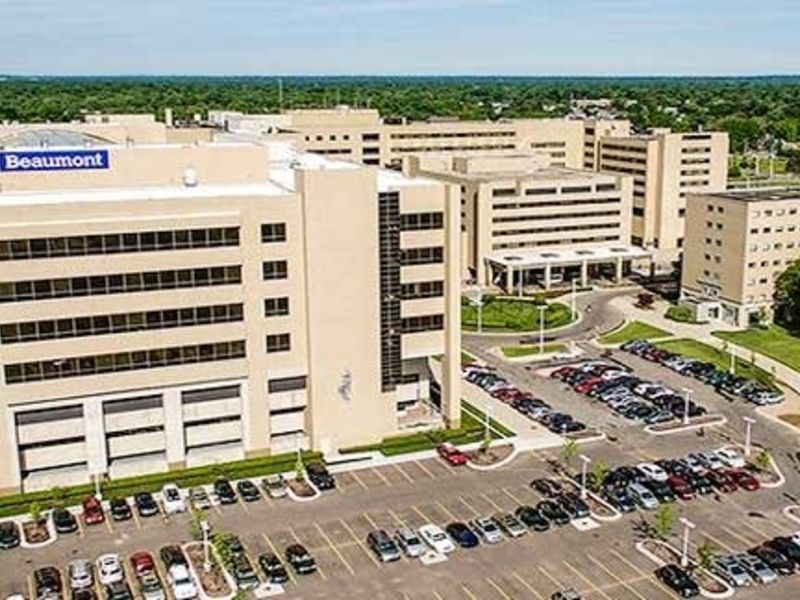Jay Greene At least 180 former Beaumont CRNA employees beginning to vote on forming a union Ballots due to National Labor Relations Board by March 22 with final tally March 29 Beaumont outsourced the CRNAs on Jan. 1 to Texas-based NorthStar Anesthesia  Beaumont Health Beaumont Health Beaumont Hospital Royal Oak is among the hospitals where NorthStar Anesthesiologists has taken over anesthesia services.
Beaumont Health Beaumont Health Beaumont Hospital Royal Oak is among the hospitals where NorthStar Anesthesiologists has taken over anesthesia services.
Nurse anesthetists at Southfield-based Beaumont Health’s three northern hospitals are taking steps to form a union after being absorbed by Irving, Texas-based NorthStar Anesthesia on Jan. 1.
About 180 certified registered nurse anesthetists, who were formerly employed at Beaumont’s Royal Oak, Troy and Grosse Pointe hospitals, signed union petition cards on Jan. 4 indicating they support the idea of forming their own local union. It would be governed by them under the name Southeast Michigan CRNAs & Associates, or SEMCA.
Two CRNAs told Crain’s they are forming a union to gain a seat at the policy table at each of the three Beaumont hospitals to directly advocate for safe staffing ratios and greater patient safety measures.
Among other issues, the CRNAs — who hold master’s or doctorate degrees, earn an average of of about $190,000 annually and perform advanced anesthesia services — also would like to negotiate improved compensation and benefits, guaranteed vacation time and regular breaks during the day.
 Sally Gribben Sally Gribben
Sally Gribben Sally Gribben
The National Labor Relations Board sent out ballots Tuesday. They are due back by March 22 and will be counted on March 29, said Sally Gribben, a CRNA at Beaumont Hospital Royal Oak and president of SEMCA.
“NorthStar, surprisingly, stipulated to an election rather than taking us to court over it, and with an agreement to have the election held at the end of (March),” said Gribben. “You need 30 percent of the group to sign authorization cards. We had 92 percent stating they would like to proceed to an election.”
Gribben said NorthStar’s CEO Adam Spiegel recently met with the CRNAs and asked them to give the company a chance to work out problems and not work to form a union.
“We told them that we gave them a chance last year and you ignored us” when the CRNAs were negotiating compensation and benefits with NorthStar, Gribben said.
“We gave them a chance and we had to get lawyers involved and negotiate (with NorthStar) on our employment terms because they weren’t acceptable,” Gribben said. “Maybe this wouldn’t have happened (if they were fairer with us). But they certainly were not making any effort of good faith in the fall. We had to get aggressive about it and now we have to do the same.”
 NorthStar Anesthesia Adam Spiegel
NorthStar Anesthesia Adam Spiegel
Spiegel, who confirmed meeting with the CRNAs and stating the company’s case, said an organized union drive by nurse anesthetists is new for the anesthesiology company. None of the other 140 hospitals and medical centers in the U.S. where NorthStar manages anesthesiology services and employs more than 500 anesthesiologists and 2,000 CRNAs have unions.
In 2018, NorthStar was acquired by Cranemere, a London-based holding company that invests in health care and other businesses firms, from TPG Growth.
“This is new for us. We were less than a week into the transition when we got the notice they were attempting to unionize and started that unionization effort,” said Spiegel, adding that NorthStar quickly had to hire labor lawyers and other union education experts.
“We asked them to give us six months to work with them. Usually unions are formed based on compensation issues or other very specific issues that the employer has not been listening,” Spiegel said. “Usually employers resolve their issues (without a union), but it sounds like the Beaumont CRNAs had issues long before we arrived.”
Speigel said he thought the Beaumont CRNAs were pleased with the employment contracts that were negotiated last fall.
“I felt like we were being very generous as a part of that process because we wanted to show the team that we’re a different employer than they’ve had in the past, and we wanted to set off on a good foot,” he said.
In Southeast Michigan, NorthStar has been contracting with six-hospital Detroit Medical Center since 2015. DMC is owned by Dallas-based Tenet Healthcare Corp. It also contracts with Spectrum Gerber Hospital in Fremont.
Last August, NorthStar started managing anesthesia services at Beaumont’s Dearborn, Taylor, Trenton, and Wayne hospitals and their associated ambulatory surgery centers and pain clinics. Beaumont’s Royal Oak, Troy and Grosse Pointe hospitals were folded into the contract on Jan. 1.
But Beaumont’s eighth hospital, Beaumont Hospital, Farmington Hills, the old Botsford hospital, continues to use employed Beaumont CRNAs and a contract anesthesia team, Beaumont has said.
Gribben said SEMCA will survey the group to gather input on what issues they want the union to negotiate in a collective bargaining agreement. She also said the CRNAs want a more competitive compensation package that compares with Henry Ford Health System and the University of Michigan.
“Those are our two biggest competitors that draws CRNAs in the communities. As it stands we are the lowest and nobody wants to come here who are experienced,” she said.
Spiegel said NorthStar pays market competitive compensation and benefits. He didn’t directly address Henry Ford, but he did acknowledge the University of Michigan could have a better employment package.
“We don’t think the package is prohibiting us from recruiting and retaining CRNAs,” Spiegel said. “I don’t think anybody in Detroit is significantly better than us, outside of that outlier (UM).”
In a statement, Beaumont Health COO Carolyn Wilson, who also is a nurse, said Beaumont is pleased with the CRNA outsourcing plan and how NorthStar has performed.
“Together, Beaumont and NorthStar are very committed to patient safety and quality, as well as provider engagement and alignment,” Wilson said. “CRNAs have been, and continue to be, essential and critical members of our integrated anesthesia care team. We are pleased with the early efforts the NorthStar team has taken to manage our anesthesia services and provide an excellent experience for our patients, physicians and CRNAs.”
Last year, a group of registered nurses, including the CRNAs when they were Beaumont employees, attempted to form a larger union with the Michigan Nurses Association.
After settling unfair labor practice charges with the NLRB in late August, the MNA dropped representation of the union and the nurses dropped their union effort. The MNA said Beaumont’s anti-union campaign was too difficult to overcome.
“The MNA burned its bridge with us. They made it apparent when they backed away from our campaign,” Gribben said.
According to the U.S. Department of Labor, Beaumont paid labor consultants $1.77 million to help it push back against the MNA-led union certification campaign.
Gribben said the Beaumont CRNAs also decided against SEIU Healthcare, the largest health care union in Michigan. SEIU has not commented on the Beaumont union issue since earlier telling Crain’s it would like to work with them.
“We had no experience with them. We decided to be our own collective bargaining unit. We wanted to be in control of all of it all,” Gribben said.
Beth Jacobs, one of the registered nurse leaders of the previous unionization effort at Beaumont, said the health system’s 3,000 RNs are not currently organizing. They can’t work on union efforts with the CRNAs any longer because they aren’t Beaumont employees.
“MNA dropped us and SEIU (officials) stopped returning my calls,” Jacobs said. “We have no other plans because Beaumont has proven their ability to fight off a union.”
Gribben said the approximate 70 CRNAs in the four southern Beaumont hospitals could eventually join their union if it is successful.
“We have done lot of legwork for the north group. We could add (the south group) later,” she said. “I know they were offered all the benefits we negotiated last fall. Historically, from a practice standpoint, the four (southern) locations never faced the critical staffing issues and workforce pressures we have had at Royal Oak.”
NorthStar employs about 250 CRNAs at seven of eight Beaumont hospitals. While it offers the CRNAs the same employment contracts, it has split hospitals into north and south groups.
Spiegel said that each hospital is overseen by NorthStar and a designed chief CRNA.
“We are a very different and flat organization. There are three people between me and the CRNAs in terms of making these decisions,” Spiegel said. “The chiefs have a say and put forward policies. We have meetings on a regular basis where we solicit their feedback from a more organic perspective because we’re not uber-bureaucrats.”
Spiegel said NorthStar is open to forming committees with the CRNAs that could include scheduling or scope of practice committees.
“We are happy to put those things together. You don’t need a union to do that,” he said.
But Gribben said it is essential to have a union with a collective bargaining agreement in place to represent the CRNAs and gain a greater say in policy and staffing decisions.
For example, Gribben said one of the problems that NorthStar has already recognized is the CRNAs are short staffed, especially at Beaumont Royal Oak where there is a need to hire at least 30 nurse anesthetists. She said six new graduates have been hired but they haven’t started working.
“We need 40 more CRNAs (at all three northern hospitals), 30 at Royal Oak and at least 10 at Troy,” Gribben said. “NorthStar says more graduates are coming, but you can’t staff a level one trauma center with all new graduates.”
Spiegel said NorthStar is recruiting and hiring but that it takes three months to get credentialed at the hospitals.
“We are trying hard to get offers out there as quickly as we can. We are ramping up our recruiting activity,” said Spiegel. “Over the next six to 12 months, when we get to the other side of COVID, we will be fully staffed. We can’t control the COVID side but we are doing everything we possibly can to get to” full staffing.
Formed in 2013 by the CRNAs at Beaumont Royal Oak in an earlier attempt to unionize, SEMCO is a 501c3 labor organization that has been dormant until now. The Farmington Hills-based law firm of Finkel Whitefield Selik will represent SEMCA.
Finkel said it is somewhat unusual for nurses to form their own labor organization, but there are several instances in Michigan and nationally where it has been successfully done.
For example, clerical and technical employees at Michigan State University have their own union. In the 1970s, residents and fellows at the University of Michigan formed the 1,300-member House Officer Association, he said.
“The goal is to reach a collective bargaining agreement and you do that by getting together and making a set of proposals for the employer, who is NorthStar,” Finkel said. “Right now they are employees with individual contracts, but under the law a CBA would supersede those individual contracts.”
Spiegel said he doesn’t believe the Beaumont CRNAs know the tradeoffs they will make by forming a union instead of working directly with NorthStar.
“They are independent practitioners. The way we tend to work with our facilities is that we like to share best practices (among hospitals),” said Spiegel, adding that the three Beaumont hospitals operate their anesthesia departments quite differently.
“You lose a lot of that autonomy when it comes to a union because you have to treat everybody the same” with the three hospitals as one unit with the same rules and policies, Spiegel said.
But Finkel said it is completely within the purview of a collective bargaining agreement to negotiate a contract that lays out different rules and policies for each Beaumont hospital.
“Of course you can (individualize the hospitals). Everything is negotiable,” Finkel said. “There are certain things you want standardized, like wages and benefits, and other things like individual procedures at each hospital you can continue. The status quo is where you start.”
Source link : https://www.modernhealthcare.com/nursing/beaumont-nurse-anesthetists-vote-union-wake-outsourcing











